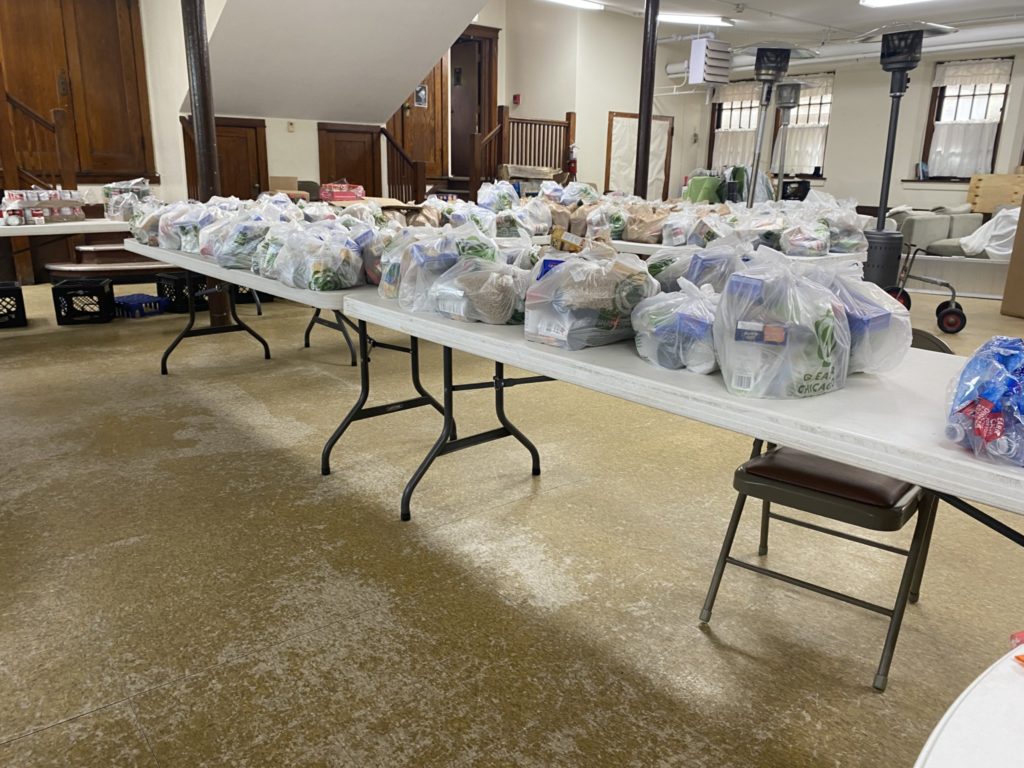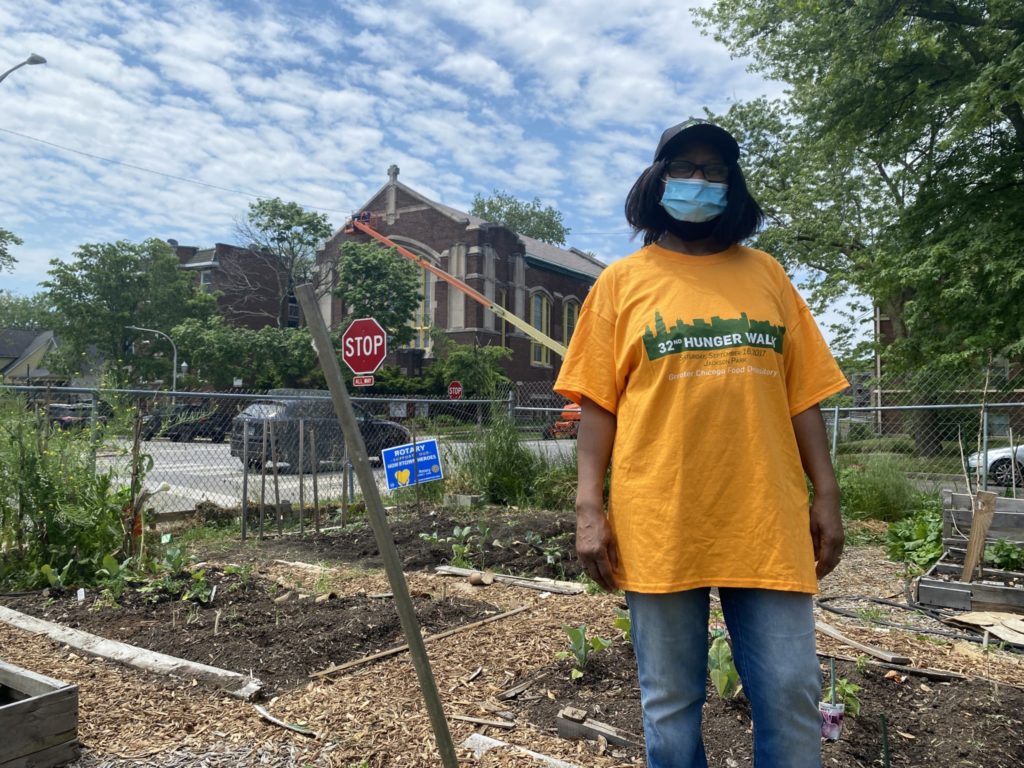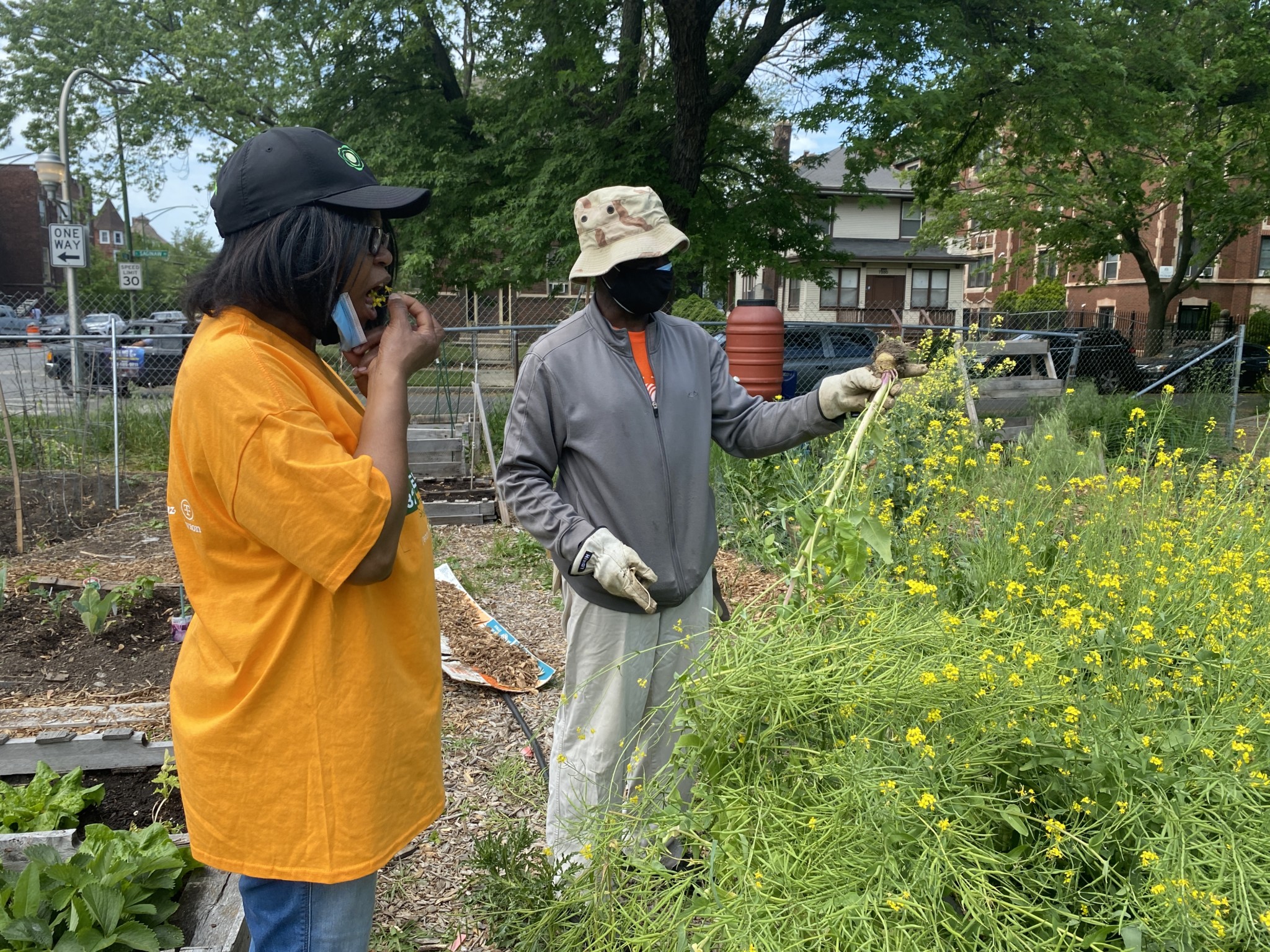On a Saturday afternoon in late May, a volunteer in a bright pink shirt gently asks a woman passing by a South Shore church, “Are you here for food?” The woman nods in response to the question, then approaches the table set up on the sidewalk outside the basement doors.
Inside, volunteers wipe sweat from their brows as they work in assembly-line fashion to pack cardboard boxes with food. First come the dry goods: beans, canned vegetables, peanut butter, and pasta. Next, the meat, yogurt and cheese are added. Then it’s out the door to the sidewalk and into the hands of people coming to the Windsor Park Lutheran Church food pantry, which is open twice a week to the public.
It all takes place under the watchful eye of Joyce Gittens, who floats around the pantry with a motherly sort of attentiveness. She deftly navigates the church and greets everyone by name, volunteers and clients alike.
Gittens, who’s sixty-six, has been a member of the church on 76th Street for forty-five years. She’s a seasoned pro at keeping the pantry running and, as she put it, “making sure that we know our brothers and sisters are fed.”
But even she had never seen anything like the last 15 months.
When stay-at-home orders went into effect in March 2020 in an attempt to stave off the spread of COVID-19, Gittens and her team at the Windsor Park pantry saw an immediate and significant increase in the number of people in need of the help they offer. Almost overnight they went from serving around one hundred families a week to serving as many as 600 families weekly from the immediate South Shore community and well beyond.
Gittens said a long line often wrapped around the corner. “That was a devastating time for our neighbors and I mean not just for our neighbors, but for all of us,” Gittens said. “Every one of us who rely on the food pantry.”

South Shore has experienced significant disinvestment over several decades. That meant a lack of adequate access to food, especially for residents without transportation, even before the pandemic. In a report identifying “high-priority communities,” the Greater Chicago Food Depository notes that South Shore and the other neighborhoods on the list have experienced long-standing “structural violence, racism, and other social and economic disadvantages that cause food insecurity as well as poor health outcomes.”
When the pandemic set in, those pre-existing inequities meant that South Shore was among the neighborhoods in the city that saw the greatest number of infections and deaths from COVID-19, as well as high numbers of unemployment. According to a Food Depository report from last August, forty-three percent of people living in South Shore were at risk of food insecurity.
According to data from the Institute for Policy Research at Northwestern University cited in a Food Depository report, more than thirty-six percent of Black households with children and nearly twenty-eight percent of Latino households with children in the Chicagoland area experienced food insecurity from September 2020 to February 2021.
“Though we saw a dramatic increase in need across the network, there’s no question that lower-income Black and brown communities on the South and West sides were the hardest hit, both by COVID-19, and the rise in food insecurity,” said Food Depository spokesman Greg Trotter. “And a lot of that has to do with years of disinvestment and systemic racism.”
The Food Depository responded to the increased need with pop-up food distribution events and grants for community partners like Windsor Park church. The need in South Shore also attracted the attention of City Hall and efforts like the mayor’s Racial Equity Rapid Response Team, which provided supplies like masks and hand sanitizer.
But now, as the City phases into its post-pandemic period, Gittens said she’s worried the needs of South Shore will slip off the radar before the community has adequate time to not only recover to pre-pandemic “normal,” but also to address the root issues the pandemic laid bare.
“People are still hurting, we are still in a pandemic. A lot of people are still unemployed and don’t have money. I think the only way people will keep their eye on it and continue to work on this is if we continue to let our representatives know,” said Gittens. “If you’re not talking about it, if you’re not meeting about it, if you’re not coming together to discuss it, it’s going to be hidden and we’re going to be right back where we were.”
Residents in South Shore have long fought for equitable food access. In 2019, they got a win when a grocery store, Local Market Foods, opened its doors on 71st Street, six years after the last grocer in South Shore shuttered. However, some residents say the new store alone was not enough to address the need in the neighborhood.
“There was a lot of fanfare when it opened, people were really excited,” said Al Walker, a South Shore resident who helps run Windsor Park church’s community garden. “But I mean, it’s got the prices of a Mariano’s or a Whole Foods when it doesn’t really even have a better quality than the Jewel, but it’s more pricey than Jewel.”
Gittens said that the cost barrier means residents are often left to get groceries from a dollar store or gas station, which lack fresh produce and healthy options. That’s something South Shore resident Yvette Moyo has been working on in the community for years. Moyo, who heads Real Men Charities, tries to raise awareness about the importance of nutritious diets. But she said she’s worried the pandemic has made it impossible for people to provide their kids with “high-quality foods.”
“If you go into one of these area grocery stores, the first thing you see is just sugar, sugar, sugar,” she said. “And you’re not seeing any fresh food, so I think the need is great and the [need for] education is great.”
Moyo’s organization began inviting kids in the neighborhood to have breakfast at the Quarry Event Center on 75th Street. Over the course of seven months, she said they served about 250 meals per week. Real Men Charities also partnered with the Food Depository last year to do pop-up food distribution events in South Shore.
“People lined up in cars and with shopping carts down for blocks, waiting for the food to be distributed. Because you know, people lost their jobs and their kids were at home. Kids that were getting breakfasts at school were eating breakfast at home and were at home all day,” Moyo said. “And you know that refrigerator does not stop opening. When you have kids, there’s not enough milk, not enough juice, there’s not enough anything.”
Moyo said she tried to infuse a sense of optimism into the events by playing empowering music like Lou Rawls and Curtis Mayfield. She wanted people to know they weren’t alone and that there wasn’t shame in coming out to get food. “While people are standing in line they’re not there with, like, a tin cup waiting—they’re dancing, happy and grateful to receive the food,” she said.
However, the logistics of running such events is complex and not sustainable, which is why they are exclusively part of the depository’s emergency response program, Trotter said. Now the distribution events are over and the focus has shifted to long-term solutions.
“We reach out and we find out who are the stakeholders, who are the key people in those communities, because we don’t want us telling the community what they need, we want to partner and for them to tell us what their needs are,” said Paula McGuire-Rowe, the manager of partner engagement for the Food Depository.
Gittens sees that need at the South Shore food pantry she helps to run. When demand kept rising, the church received a capacity-building grant from the Food Depository for $75,000, which allowed them to open their doors an additional day every week. In addition to their Saturday hours, the pantry is also now open on Tuesday afternoons, which Gittens said they will keep doing as long as the demand is there.
The grant also gave the pantry the ability to build a walk-in cooler to store more perishable items, pay the volunteers a stipend, and expand youth programming in the community garden.

On Saturdays, Gittens often spends time working in the garden after the pantry closes. The green space, which sits kitty-corner from the church, provides some fresh produce to the pantry; goods like okra, celery, squash, watermelon and lettuce. It’s grown significantly over the years, said Walker, the head gardener, who is quick to excitedly point out the butterflies and bumble bees buzzing around. For Walker the space is really about providing an opportunity for kids in the neighborhood, especially after they spent so much time at home amid the pandemic.
Walker, fifty-two, grew up in South Shore and remembers a thriving neighborhood with youth centers and all sorts of clubs and activities, like 4H, Boy Scouts, and Girl Scouts.
“Now it’s hard to find any of that stuff,” he said. “And so if we can just provide a little bit of extracurricular activity for the young people to have as they’re growing up to increase their life experience, that’s a motivating factor.”
People like Walker, Moyo, and Gittens are on the frontlines of reminding people what their community once was and what they want to see it become. But Gittens said the gap in services in the neighborhood makes people feel like they aren’t valued or cared for by the City as a whole.
“We need services in the community. We don’t even have a clinic in the immediate community,” Gittens said. “We need food service, we need social services, we need medical health care services, we need housing. There are so many services that we need right now in the South Shore community.”
She knows it’s hard for people to keep going when they feel like no one is listening, which is why Gittens said she’d like to see a forum established where residents can speak directly to elected officials about what they have been through and what they need. She said politicians need to know what it’s been like. Even as the pandemic wanes there will be long-lasting impacts and challenges, not to mention the needs and inequities that existed beforehand.
Gittens has started to see the line get shorter at the food pantry every week, but she knows there’s “a long way to go.” As she walks to the church doors from the garden, residents greet her. “I’ll be right with you,” she says. “Be right there.”
This story was reported in partnership with the Metro Media Lab, a project of the Medill School at Northwestern University, supported by the Robert R. McCormick Foundation.
Courtney Kueppers is a Chicago-based journalist and graduate student at Northwestern University. This is her first piece for the Weekly.


Nice to read. So useful and informative tips. Many thanks for sharing them all.
cool reading this
lot of learning
was cool thankss
we need this man